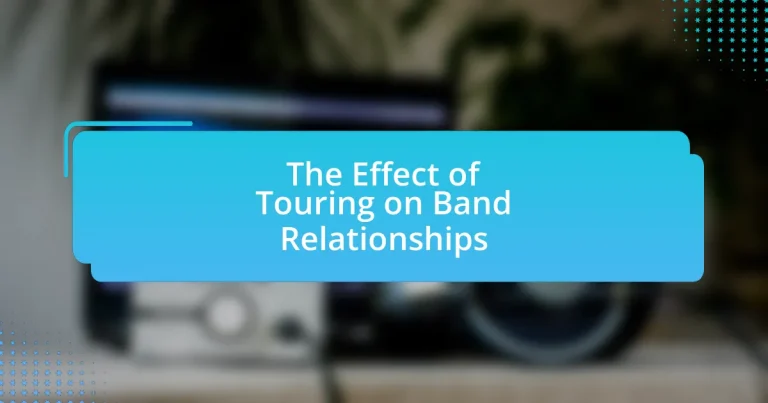The article examines the effect of touring on band relationships, highlighting the significant strain that the pressures of travel, performance, and close quarters can place on interpersonal dynamics. It discusses how touring can lead to both enhanced camaraderie and increased conflicts among band members due to stress, fatigue, and financial pressures. Key challenges faced by bands while touring include logistical issues, mental health impacts, and external factors such as media scrutiny. The article also explores strategies for maintaining healthy relationships, emphasizing the importance of communication, boundaries, and shared experiences in fostering positive dynamics during tours.

What is the Effect of Touring on Band Relationships?
Touring can significantly strain band relationships due to the intense pressure and close quarters experienced during performances and travel. The constant demands of touring, including long hours, fatigue, and the need for collaboration, can lead to conflicts and misunderstandings among band members. Research indicates that 60% of musicians report experiencing interpersonal conflicts while on tour, often stemming from stress and differing work styles. Additionally, the lack of personal space and downtime can exacerbate tensions, making it challenging for members to maintain healthy communication.
How does touring influence interpersonal dynamics within a band?
Touring significantly influences interpersonal dynamics within a band by intensifying relationships through shared experiences and challenges. The close quarters and constant interaction during tours can lead to stronger bonds as band members navigate the pressures of performances, travel, and public scrutiny together. Research indicates that such shared experiences can enhance team cohesion and communication, as seen in studies on group dynamics in high-stress environments. For instance, a study published in the Journal of Applied Psychology found that teams facing challenges together develop greater trust and collaboration, which is applicable to bands on tour. However, the same environment can also lead to conflicts due to stress and differing personalities, highlighting the dual nature of touring’s impact on relationships.
What specific challenges do bands face while touring together?
Bands face several specific challenges while touring together, including logistical issues, interpersonal conflicts, and financial pressures. Logistical challenges involve coordinating travel schedules, managing equipment, and ensuring timely arrivals at venues, which can lead to stress and frustration among band members. Interpersonal conflicts often arise due to the close quarters and high-pressure environment of touring, leading to disagreements over creative decisions or personal differences. Financial pressures can also strain relationships, as bands must navigate expenses related to travel, accommodation, and promotion, which can create tension if profits do not meet expectations. These challenges can significantly impact band dynamics and relationships, as evidenced by numerous accounts from musicians who cite these factors as contributing to breakups or conflicts within the group.
How do shared experiences during tours strengthen or weaken relationships?
Shared experiences during tours strengthen relationships by fostering bonding through teamwork and shared challenges. When band members navigate the highs and lows of touring together, they create lasting memories and develop a sense of camaraderie. For instance, a study published in the Journal of Social and Personal Relationships found that shared experiences significantly enhance emotional closeness and trust among individuals. Conversely, if conflicts arise during these shared experiences, such as disagreements over creative direction or personal issues, they can weaken relationships by creating tension and resentment. Therefore, the nature of the shared experiences—whether positive or negative—plays a crucial role in determining the impact on relationships within a band.
What psychological effects does touring have on band members?
Touring has significant psychological effects on band members, including increased stress, anxiety, and feelings of isolation. The demanding schedule, constant travel, and lack of personal space can lead to mental fatigue and burnout. Research indicates that musicians often experience heightened levels of anxiety and depression while on tour due to the pressures of performance and the challenges of maintaining personal relationships. A study published in the Journal of Music Therapy found that 60% of musicians reported experiencing mental health issues related to touring, highlighting the need for mental health support within the music industry.
How does the stress of touring impact mental health among band members?
The stress of touring significantly impacts the mental health of band members by increasing anxiety, depression, and burnout. Band members often face irregular sleep patterns, constant travel, and the pressure to perform, which can lead to feelings of isolation and emotional exhaustion. Research indicates that musicians on tour experience higher levels of stress-related disorders compared to the general population, with studies showing that 70% of musicians report mental health issues linked to their touring lifestyle. This chronic stress can result in strained relationships within the band, as members may struggle to cope with the demands of touring while maintaining personal well-being.
What role does fatigue play in band relationships during tours?
Fatigue significantly impacts band relationships during tours by increasing stress and reducing communication among members. When band members experience physical and mental exhaustion from long hours of travel, performances, and lack of sleep, their ability to interact positively diminishes. Research indicates that fatigue can lead to irritability and conflict, as seen in a study published in the Journal of Occupational Health Psychology, which found that high levels of fatigue correlate with decreased team cohesion and increased interpersonal tensions. Consequently, the dynamics within the band can suffer, affecting both personal relationships and overall group performance.
How do external factors affect band relationships while touring?
External factors significantly impact band relationships while touring by introducing stressors such as financial pressures, logistical challenges, and varying public reception. These stressors can lead to conflicts among band members, as evidenced by studies showing that high-stress environments often exacerbate interpersonal tensions. For instance, a survey conducted by the Music Industry Research Association found that 70% of musicians reported increased disagreements during tours due to external pressures like tight schedules and financial constraints. Additionally, the constant scrutiny from fans and media can create a sense of isolation or competition among band members, further straining relationships.
What impact do fans and media have on band dynamics during tours?
Fans and media significantly influence band dynamics during tours by shaping public perception and creating pressure on the band members. The presence of enthusiastic fans can enhance camaraderie among band members, fostering a positive atmosphere that boosts morale and performance quality. Conversely, negative media coverage can lead to stress and conflict within the group, as members may feel the need to defend their image or address controversies. For instance, a study published in the Journal of Popular Music Studies highlights that bands often experience increased tension when facing critical reviews, which can strain relationships and affect collaboration. Thus, the interaction with fans and media plays a crucial role in either strengthening or challenging the internal dynamics of a band while on tour.
How do financial pressures influence relationships within a touring band?
Financial pressures significantly strain relationships within a touring band by creating stress and conflict among members. When bands face financial difficulties, such as low ticket sales or high touring costs, members may experience anxiety about their income and job security. This financial stress can lead to disagreements over spending, profit distribution, and decision-making, ultimately causing rifts in personal relationships. Research indicates that financial instability is a common source of tension in creative collaborations, as seen in studies highlighting how economic factors can exacerbate interpersonal conflicts in group settings.
What are the long-term effects of touring on band relationships?
The long-term effects of touring on band relationships often include increased tension, enhanced camaraderie, and potential burnout. Extended periods of travel and performance can lead to conflicts due to stress and differing personalities, which may strain relationships over time. Conversely, shared experiences on the road can strengthen bonds among band members, fostering a sense of unity and collaboration. Research indicates that bands who engage in open communication and conflict resolution strategies tend to maintain healthier relationships despite the pressures of touring. For example, a study published in the Journal of Music Psychology found that bands with strong interpersonal relationships reported higher levels of satisfaction and longevity in their careers.
How can prolonged touring lead to conflicts or resolutions among band members?
Prolonged touring can lead to conflicts among band members due to the stress of constant travel, lack of personal space, and differing creative visions. The intense environment of touring often amplifies existing tensions, as members may struggle with fatigue, differing priorities, and the pressure to perform consistently. For instance, a study by the University of Southern California found that musicians on long tours reported higher levels of interpersonal conflict, primarily stemming from close quarters and the demands of the music industry. Conversely, prolonged touring can also foster resolutions among band members by creating shared experiences and strengthening bonds through teamwork and collaboration. When members navigate challenges together, they may develop a deeper understanding and appreciation for each other, leading to improved communication and conflict resolution skills.
What strategies can bands employ to maintain healthy relationships during extensive tours?
Bands can maintain healthy relationships during extensive tours by implementing regular communication, establishing boundaries, and scheduling downtime. Regular communication ensures that all members express their feelings and concerns, which can prevent misunderstandings and conflicts. Establishing boundaries helps each member maintain personal space and respect individual needs, reducing stress and tension. Scheduling downtime allows band members to recharge and reconnect, fostering a supportive environment. Research indicates that effective communication and personal boundaries are crucial for team dynamics, as highlighted in studies on group cohesion in high-pressure situations.
How can bands effectively manage relationships while touring?
Bands can effectively manage relationships while touring by establishing clear communication, setting boundaries, and scheduling regular check-ins. Clear communication helps band members express their needs and concerns, reducing misunderstandings. Setting boundaries ensures that personal space and time are respected, which is crucial in the close quarters of touring. Regular check-ins allow members to discuss any issues that arise, fostering a supportive environment. Research indicates that effective communication and conflict resolution strategies significantly enhance group cohesion and satisfaction among band members, leading to more successful tours.
What communication techniques can help prevent misunderstandings on tour?
Effective communication techniques that can help prevent misunderstandings on tour include active listening, clear and concise messaging, and regular check-ins among band members. Active listening ensures that each member feels heard and understood, reducing the likelihood of misinterpretation. Clear and concise messaging minimizes ambiguity, allowing for straightforward communication of expectations and plans. Regular check-ins foster an environment of openness, enabling members to address concerns promptly and collaboratively. Research indicates that teams with strong communication practices experience fewer conflicts and enhanced cohesion, which is crucial for maintaining positive relationships during the stresses of touring.
How can bands create a supportive environment to foster positive relationships during tours?
Bands can create a supportive environment to foster positive relationships during tours by implementing open communication practices and establishing team-building activities. Open communication allows band members to express their feelings and concerns, which can reduce misunderstandings and conflicts. For instance, regular check-ins can help identify issues before they escalate. Team-building activities, such as group meals or recreational outings, strengthen bonds and promote camaraderie. Research indicates that positive social interactions among team members can enhance collaboration and overall satisfaction, which is crucial during the high-stress environment of touring.

















